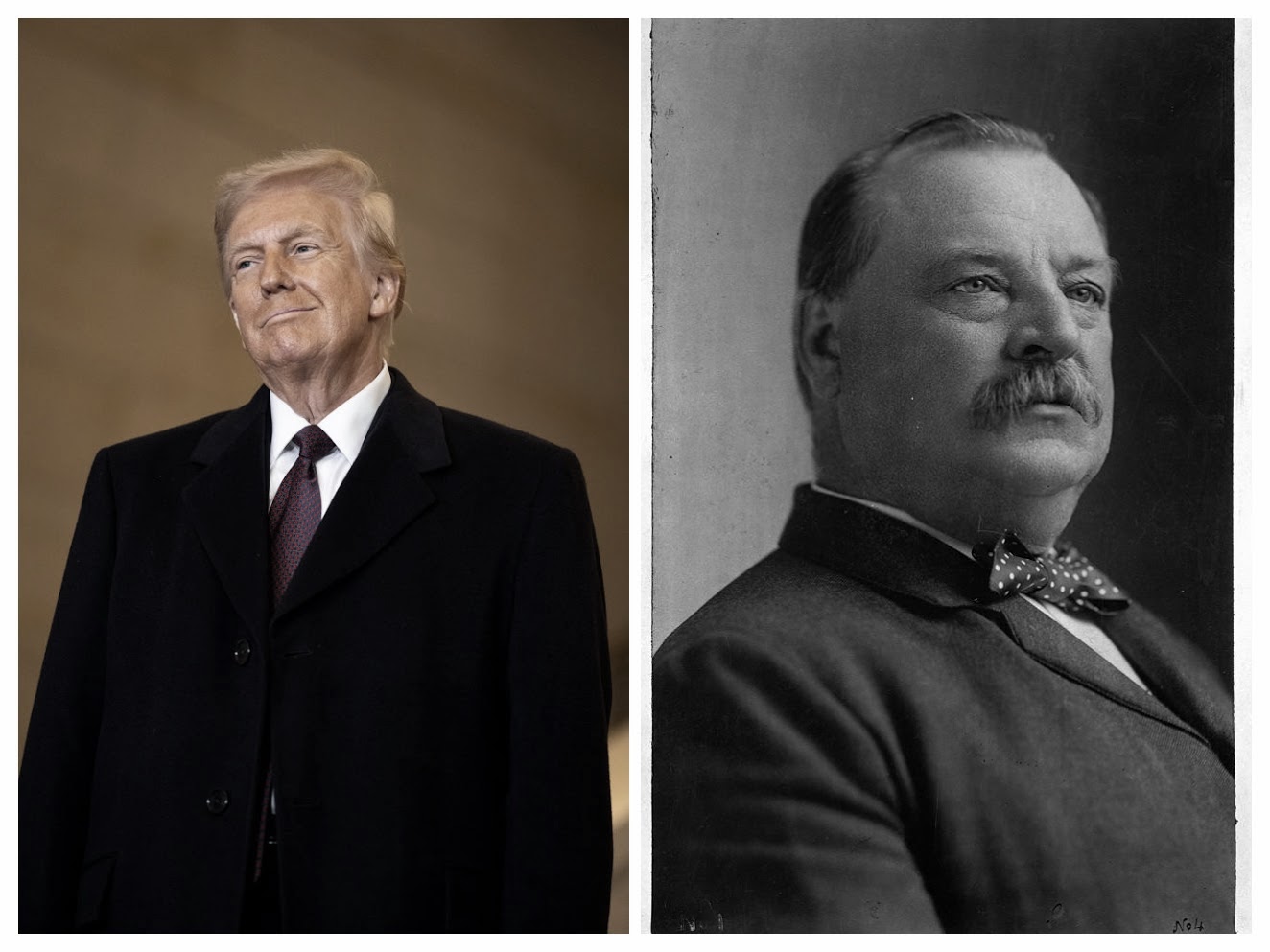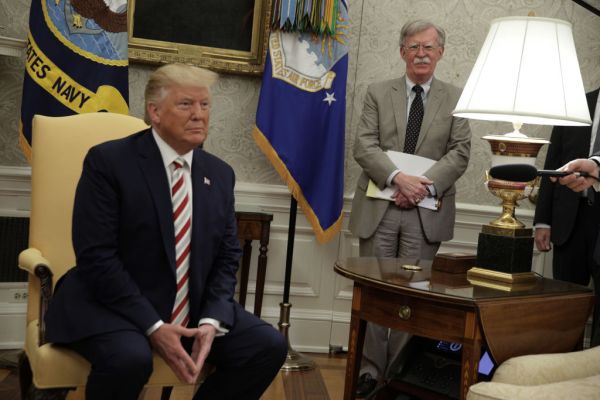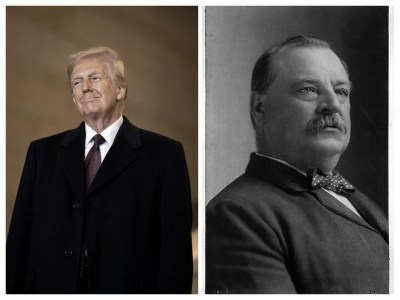With a chilling wind blowing through the nation’s capital, a former president turned out of office by the voters four years earlier took the oath again. The culmination of a period of political uncertainty in which populism was on the rise, the new president’s inaugural address focused on trade, economic stability, and a restoration of the nation’s character.
“It can not be doubted that our stupendous achievements as a people and our country’s robust strength have given rise to heedlessness of those laws governing our national health which we can no more evade than human life can escape the laws of God and nature,” said the new president in his speech at the U.S. Capitol.
If it’s not obvious, the line was spoken not by Donald Trump but by Grover Cleveland, who until Monday’s inauguration was the only president to serve nonconsecutive terms. Cleveland, like Trump a New Yorker but unlike Trump a Democrat, had first won the presidency in 1884 but was defeated for reelection after a single term by Republican Benjamin Harrison. Yet by 1892, the country had soured on Harrison’s leadership and Cleveland, easily renominated by his party, won the rematch.
Cleveland was inaugurated in March, not January, but the weather in Washington was eerily similar 132 years ago to this week’s: just below freezing, with some snow on the ground. The country’s precarious economic condition was highest in the minds of many Americans then as it is now. And both Cleveland and Trump returned to office in part on a sort of political nostalgia for the policies—in Cleveland’s case, civil service reform, support for a gold standard, and reduction of tariffs—they had each championed during their first terms.
Trump is a populist’s populist, talking up in overly optimistic terms the terrific future ahead for America under his leadership without much talk of trade-offs. By comparison, Cleveland comes across as responsible but hectoring, using the inaugural address to remind Americans of their own virtues. Fully invested in his own political comeback story, Trump even spent his address touting his performance in the election (and falsely complaining in remarks later in the day that the previous election had been stolen from him). Cleveland doesn’t mention an election or grubby politics. Instead, his address is designed to be read in newspapers and pamphlets, written in lengthy, complex sentences. Trump’s simple sentences, part of the bipartisan trajectory of the dumbing down of presidential rhetoric, is meant to be clipped for social media and TV news.
Both second-chance presidents spoke about their mandates, though in remarkably different ways. Cleveland spoke of the authority that his fellow citizens entrusted to him, promising his “obedience” to “the mandate of my countrymen” to be in their service. Trump, on the other hand, employs the modern understanding of the term as a validation of his political platform and a license to pursue his agenda freely. “My recent election is a mandate to completely and totally reverse a horrible betrayal and all of these many betrayals that have taken place and to give the people back their faith, their wealth, their democracy and indeed, their freedom,” he said Monday.
Not surprisingly, Trump peppered his address with his typical over-the-top promises and exaggerated claims of what his administration would accomplish for the American people. “The golden age of America begins right now,” Trump began on Monday. The president pledged his government will “bring prices down,” “end the chronic disease epidemic,” and “eliminate the presence of all foreign gangs and criminal networks” in the United States.
“We stand on the verge of the four greatest years in American history. With your help, we will restore America’s promise, and we will rebuild the nation that we love,” he said. “And we love it so much.”
Cleveland offered no such grand promises, choosing instead to lecture his fellow citizens about governmental paternalism (what we would now call the welfare state, an idea that was only then just gaining interest in western democracies) and fiscal responsibility.
“The lessons of paternalism ought to be unlearned and the better lesson taught that while the people should patriotically and cheerfully support their government its functions do not include the support of the people,” Cleveland said, wagging his finger about government waste.
Beyond the different standards of inaugural addresses in the 19th century, there was a reason for Cleveland’s dour rhetoric. Just days before his term began, an economic crisis began unfolding when a major railroad declared bankruptcy as the U.S. Treasury’s gold reserves were depleted. The sense that the impressive economic growth of the United States following the Civil War was ebbing is front-and-center in Cleveland’s remarks.
“The strong man who in the confidence of sturdy health courts the sternest activities of life and rejoices in the hardihood of constant labor may still have lurking near his vitals the unheeded disease that dooms him to sudden collapse,” he said.
But while Cleveland cast trade protectionism as a practice which “undermines the self-reliance of our people and substitutes in its place dependence upon governmental favoritism,” Trump has made more and higher tariffs the centerpiece of his economic remedy.
“I will immediately begin the overhaul of our trade system to protect American workers and families. Instead of taxing our citizens to enrich other countries, we will tariff and tax foreign countries to enrich our citizens,” Trump said Monday, touting a policy that the free-trader Cleveland would have abhorred.
As Trump concluded his address, which sounded more like a campaign stump speech than a traditional inaugural, he offered an iteration of the great things that will take place during his term in short parallel phrases. “We will be prosperous, we will be proud, we will be strong, and we will win like never before,” he said. “We will not be conquered, we will not be intimidated, we will not be broken, and we will not fail.” The limits of America under the steady guidance of Trump’s magnificent hand will be impossible to define, if you believe him.
Cleveland, from another time and perhaps with the understanding of the limits of what one chief executive can do in four measly years, concluded with a more eloquent contemplation of presidential sobriety—all the more arresting when considering recent presidential excesses.
“The oath I now take to preserve, protect, and defend the Constitution of the United States not only impressively defines the great responsibility I assume, but suggests obedience to constitutional commands as the rule by which my official conduct must be guided,” Cleveland said. “I shall to the best of my ability and within my sphere of duty preserve the Constitution by loyally protecting every grant of Federal power it contains, by defending all its restraints when attacked by impatience and restlessness, and by enforcing its limitations and reservations in favor of the States and the people.”







Please note that we at The Dispatch hold ourselves, our work, and our commenters to a higher standard than other places on the internet. We welcome comments that foster genuine debate or discussion—including comments critical of us or our work—but responses that include ad hominem attacks on fellow Dispatch members or are intended to stoke fear and anger may be moderated.
With your membership, you only have the ability to comment on The Morning Dispatch articles. Consider upgrading to join the conversation everywhere.